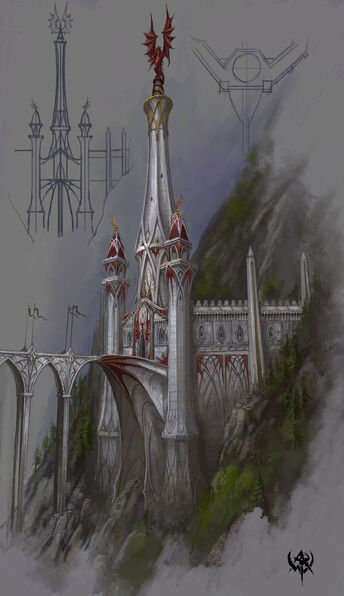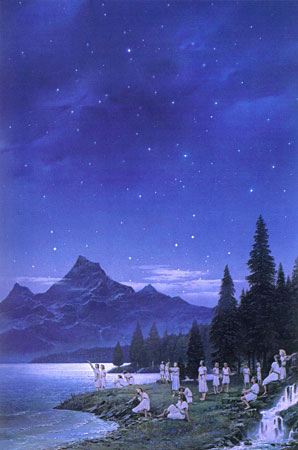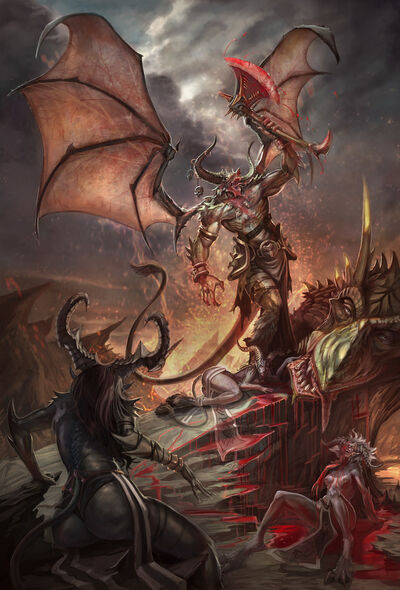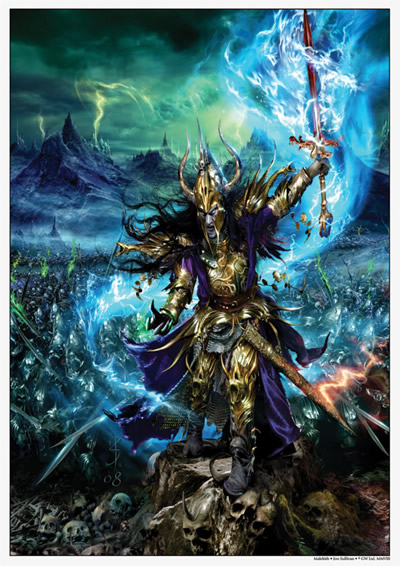
The High Elves are a sub-sect of the Elven race that live on the ancestoral Elven Homeland of Ulthuan. The High Elves are the most civilized and ordered of the High Elven branches, and they have become the most industrialized section of the Elven population. The High Elves or the "Teleri"are the direct decendants of the original Elven Empire. They control a Kingdom based on the Elven ancestoral homeland of Ulthuan.
They are the most powerful of the species, but are also faced with the most dangers of the three. They are almost physically flawless and rarely succumb to disease or mutation and can live for hundreds even thousands of years. They are usually seen as being arrogant, aloof, and overly concerned with beauty and art, a reputation which is not completely unfounded for in return they generally view themselves as being superior to other races. They hold an ancient enmity towards the Dwarves, ever since the disastrous War of the Beard when the two races fought a bloody war against each other that lasted for centuries. They have fought against the spread of Chaos since it first appeared in the world, but their bitterest stuggle is against their own kin, the Dark Elves.
They are almost physically flawless and rarely succumb to disease or mutation and can live for hundreds even thousands of years. The High Elves are different then the rest in the way that they are somewhat of a hybrid of all the different subsects of the Elven race. There are pieces of the Sindar, Dark, and even small Snow Elven segments of the overall High Elven culture. This split is what has led to the different groups slowly leaving the overall group to live the way they specifically wish too.
The High Elves and the Elven Race first came to being during the The High Elves became an Empire in the form of the Atmer Empire following the creation of the Elves, and they were placed on the island of Ulthuan by their Titan Lords. On Ulthuan they dominated for generations until the Titans lost in their civil war and the forces of Chaos invaded the world of Earth. During this war the forces of the High Elves would be left near destruction but in the end they would be victorious and this would lead into their dominating period of Golden Age. During their golden age the High Elves would expand out and become truly mighty in terms of every scale that defines a great Empire. Their fall would occur from within when they suffered a series of devestating wars of which begin with the War of Vengeance with the Dwarves, and then led to the Sundering of which led to the creation of the Dark Elves and from that point on an enemy that would forever be against the High Elves. With their population and colonies all but gone the High Elves suffered two last moments of destruction and loss when they first watched the exodus of the Sindar Elves which diminshed their internal strength and left them all alone on the island of Ulthuan that was once home to many different kinds of Elves. Following this they were forced to watch as their largest colony of Tail Vena taken over by the Sindar Elf (one could easily argue he is a Dark Elf) Illidan Stormrage and from this the creation of yet another hybrid of the Elves in the Satyr. Following this loss the High Elves have pulled back into their fortresses and are putting all of their weight behind the actual fortification, and growth amongst the places they have left.
Overview[]
Commonly known as High Elves, the Asur inhabit the ancient Elven kingdoms on the island of Ulthuan , the capital of which is Lothern. Since the tragic time of the Elven Civil War , High Elven culture has shunned its darker nature, tending to emphasise traits such as nobility and purity, with a particular emphasis on personal self-control. Their poetry and music can seem fairly simple and abstract at first, but it invariably contains dual meanings and hidden depths designed to clear the mind of emotion and focus the attention upon the essence of the piece. Asur craftsmanship is founded on the work of artisans who dedicate centuries of their life to mastery of their craft, as they strive to find the perfect balance between form and function. Their work tends to be incredibly intricate, involving elaborate detail and intricate decorative touches, yet their items are also ideally suited for the purpose for which they are made, whether it be blades, armour or the humble work of a carpenter.
History[]
The Creation of the Elves[]
Main Article : Elves

- “He loved the Elves when we were young. To have seen him with the people he had birthed, was to witness love in it's most pure form. He spent years on making sure every inch of Ulthuan was perfect for his people...and to see this. His fall was all the more painful because I know now he cares for nothing anymore. The love he knew is gone...Its just gone.”
- — Artemis
Slanaash was one of the first Titans created, and among his earliest works was the creation of the Elves of whom would come to dominate the continent of Ulthuan which he birthed from the ocean with the help of his fellow Titans. In order to bring these Elves to Ulthuan he fashioned seventeen pairs of males and females forming the seventeen Elder Houses of whom would begin to populate the island of Ulthuan. Wanting to expand them quicker Slanaash would create hundreds of more pairs of whom came to Ulthuan and became known as the Great Houses of Ulthuan, and thus allowed the population to expand even quicker. During this time Slanaash walked Ulthuan constantly as he was obsessively in love with the Elves alongside his beloved Artemis of whom became the almost mother of the Elves, and during this early time Slanaash and Artemis would form the early foundations of the Elven Pantheon based around Slanaash's persona as Asuryan.
War with Chaos[]
Main Article : First War with Chaos

In the beginning of High Elf recorded history, the Elves were one race and dwelt in many separate kingdoms on Ulthuan. When the warp gates at the planet's poles failed and the stuff of chaos spilled into the world, daemons and other creatures began preying upon the early Elves. A great hero Aenarion, later called The Defender arose and forged an alliance between the rival Elven states. United, the Elves drove back the creatures of Chaos and Aenarion was crowned the first Pheonix King, taking Astarielle as his Everqueen. After a time, the minions of Chaos invaded again, this time with corrupted human followers. A host of daemons invaded Avelorn and slew the Everqueen and, it was believed, Aenarion's two children. Aenarion fell deeply in love with Morathi and from their union she later bore Malekith. However, maddened by his losses and the attacks on his people, Aenarion drew the Sword of Khaine and led the Elven host to war. Aenarion won a titanic battle and managed to plunge the sword back into the Altar of Khaine before he died. His sacrifice bought time for Caledor Dragontamer to enact his plan to drain the Chaos energy away from the world.
War of the Beards[]
Main Article : War of Vengeance

- "Before the War of Vengeance the Dwarves and High Elves had what seemed to be inexhaustible armies. The War of Vengeance showed how wrong that thought was."
- -Flemeth
The War of Vengeance was a massive conflict between the expanding High Elf Empire , and the Dwarven Empire of Karak Ankor. The conflict centered in France but it spread as far east as the World Edge Mountains in Croatia.The conflict was started by the enemies of the High Elves in the Dark Elves, who began raiding groups of Dwarven traders and framing the murders on the High Elves. This led to the arrogant Pheonix King at the time to treat the Dwarves with less then the respect they had usually gotten as a great ally of the High Elves. The two sides could never agree on a means to end the conflict and because of this they would wage war on eachother. The conflict ended when the Dark Elves launched their invasion of Ulthuan and the High Elves were forced to retreat from Europe. The war itself would lead to the utter exhaustion of both races, and lead to their steep downfalls after this war.
The Elven Civil War[]
Main Article : Elven Civil War
| The Elven Civil War We had survived the destruction of our home from demons. Gods had tried to destroy us. It was only ourselves who could truly end us. |
|---|
 Emperor of Druchii
According to birthright, Malekith, son of the first Phoenix King Aenarion a member of the House of Aestarion, and an Elven enchantress called Morathi born of the House of Beren, was the rightful successor to the throne of Ulthuan. But when Aenarion Aestarion died, the ruling Council of Princes decided that Malekith was too impetuous and warlike, as Aenarion had led the Elves through a great war and the population was extremely weary of conflict. Declaring that Malekith was not fit to rule, they selected another to sit on the throne - Bel Shanaar Elwe the prince of Tiranoc, a member of the House of Elwe, and a hero of the war. Malekith was instead given the rank of High General and supreme commander of the armies. This suited him well, as he was an outstanding warrior and peerless general, just as his father was. During his time in the army he wandered the globe, and with his mother's guidance, started experimenting with Dark Magic. After some time, Malekith became discontent. In his mind the Elves must be a warlike people to face the ever-growing menace from the forces of Chaos. He became increasingly critical of the Princes, who grew soft and complacent under the protection of his armies. Worse yet, the Cult of Pleasure, a society of poets and artists, founded by Morathi herself, turned out to be a Cult of Slanaash. Their practices were taking root in Elf society, being particularly strong in Nagarythe. Upon hearing of this, Malekith took personal command of the investigation and used this power to eliminate his political enemies, accusing them falsely of being cultists and executing them without trial. The Coup[] Burned by the flame
It was then that Malekith saw his chance to seize his birthright. He claimed Bel-Shanaar was a worshipper of Slaanesh. Soon after the accusation, Bel-Shanaar died of poisoning. Those loyal to the Council accused Malekith of assassination. Those loyal to Malekith claimed Bel-Shanaar committed suicide out of shame. The argument between Malekith and the Council of Princes turned violent, and Malekith and his followers killed most of the Princes, claiming to save Ulthuan. Now the Council was destroyed, Malekith had only to pass through the Sacred Fire of Asuryan, king of the Elven Gods. He stepped forwards, confident he would pass the ordeal just as his father did. Yet the Sacred Flame burned him, scarring him horrifically. His followers claimed treachery - that the fires must have been corrupted by magic to reject even the rightful heir. They fled back to the province of Nagarythe, and in confusion over the death of their king and council, the High Elves (comprised of the other Kingdoms of Ulthuan, and a small body of resistance in Nagarythe which would later become the Shadow Warriors) did not pursue. Near death, Malekith was taken to one of his mother's temples. His body had healed sufficiently, but his mind was destroyed beyond repair and he had gone insane. He knew of the need to lead his followers into battle against the High Elves, but also knew his withered body would not survive the battle. Morathi called upon Hotek, a renegade priest of Vaul, to forge the Armour of Midnight, a suit of armour that would give life and strength to Malekith's flame-ravaged body. The armour fused directly to his skin, forming a sorcerous shell granting him immense supernatural powers. From that day forth, Malekith was known as the "Witch King", for he truly had become a figure of dread. Once healed, Malekith was consumed with a bitter hatred for those who has resisted him . He summoned those Elves who were loyal to him to aid him in taking the throne by force. This included a large part of the standing military, most of his home province of Nagarythe and many other Elves throughout Ulthuan who believed in Malekith's cause. |
Decline[]
Military of the High Elves[]
The armies of the High Elves are primarily based around the citizen levy. Every adult Asur must spend time in the militia as an archer and a spearman, training to be a warrior so that when called upon, almost the entire population of Ulthuan can be mobilised for war. The bulk of the cavalry is made up of the lesser sons of the High Elf nobility, known as Silver Helms.
Additionally, the kingdoms of Ulthuan can provide specialised troops as required: The Sea Guard of Eataine, White Lions of Chrace, Swordmasters of Saphery, Shadow Warriors from the Shadowlands, Ellyrian Reavers -light cavalry knights from Ellyrion, The Maiden Guard of Avelorn, Tiranoc charioteers, and the fabled Dragon Princes of Caledor. The Phoenix Guard are perhaps the most elite of all Asur warriors, silent guardians of the Shrine of Asuryan. There are also two kingdoms of Ulthuan, Yvresse and Cothique, which provide no specialised troops to speak of.
Magi in High Elven Culture[]
Whilst lesser races must study the magi in its corrupted, broken form, High Elf Archmages harness the power Qhaysh, or High Magi, as pure, mystical energy. The minor spells of the Lores Of Magic taught to the human Magi of Europe by the legendary High Elf Mage Teclis are but a pale reflection of the power that can be wielded by an Archmage fully trained in the magical arts at the White Tower.
Goverment[]
The High Elves of the Atmer Empire are ruled by the twin thrones of the Phoenix King (Chosen by the Council of Princes) and the Everqueen, the marriage between which symbolises the twin nature of the Elven psyche. It is this overlording power that controls the overall direction of the High Elves on Ulthuan.
The Phoenix King[]
The Phoenix King is the commander of the armies of Ulthuan and determines the level of engagement with the world at large.

See Also :Finubar Seafarer
Finubar Aestarion the "Seafarer" is the Phoenix King of the High Elves, and the husband of Alerielle Aestarion the Everqueen of the High Elves. Finubar and Alerielle have two children in Teclis, and Tyrion of which his son Tyrion is an extremely powerful Magi that many point to as the most powerful Magi of the elven race, while his son Teclis is the major commander of the High Elven Empire and has become widely known for this reputation.
Finubar Seafarer was the oldest child of his father who at that point was a high ranking commander of the current Pheonix King of Ulthuan and from this it was seen by many that he might be in line for the next Pheonix King of the High Elves. During his youth and growth he became a skilled captain of a fleet of High Elven ships of which he used to travel throughout the High Elven colonies and pushed the agenda of his Pheonix King of whome he became increasingly close too. Through this closeness he became a leading diplomat of the High Elves and fell into a pathway of going back and forth between Ulthuan, and western Europe where he grew very popular amongst the Dwarves for his kindness and thoughtfullness towards them. Finubar Seafarer was already famous for his voyages to Europe before being elected by the princes of the High Elves.
Historical Phoenix Kings[]
- Aenarion
- Bel Shanaar
- Caledor
- Caledor II.
- Caradryl
- Tethlis
- Bel Khordrashis
- Aethis
- Morvael
- Bel Hathor
- Finubar Seafarer
Everqueen[]
The Everqueen is the spiritual leader of the Asur, responsible for the inner well-being of the people and the land in which they live.

See Also : Alerielle Aestarion
Alerielle Aestarion is the current Everqueen of the High Elves, and as well is the wife of the Phoenix King and mother of Tyrion, and Teclis Aestarion.
Alerielle was born shortly before the Sundering, and because of this she was not present for much of what many in Ulthuan saw as the coruption of the High Elves. She watched helplessely as the Everqueen at the time was butchered during the Sundering and following this she was forced into a more active role in the High Elven war effort. Because she is naive to this fact, she has attempted to bridge the gap between the Sindar Elves, and the High Elves in the hope that they can all work together again. This has led to her on numerous occasions visiting the Sindar Forest of High Forest, and at the same time this has forced the Elves to continue relations with both the Kingdom of Umbar, and the Kingom of Gondor. In these two relationships the Everqueen is forced to continuesly balance the needs of the two sides.
Culture[]
Language[]
Main Article : Eltharin
Eltharin is the ancient language of the Elves. Eltharin was developed many millennia ago in a time when humans where still uttering primitive grunts and were yet to develop written language. In a similar manner to Khazalid the language of the Dwarfs, it has remained almost unchanged for thousands of years, however unlike Khazalid, several variations of Eltharin are spoken by the different Elven kindreds. Eltharin is a divided language and several dialects are spoken by the various Elven kindreds. Though all these originated in Eltharin, some are so drastically different (being greatly changed by their isolation from Eltharin) that they could almost be called separate languages in their own right.
Lesser-known amongst the Elven languages is Anoqeyån, an ancient tongue used solely to shape the Winds of Magic into powerful spells, and is believed to be the closest surviving mortal language to the words spoken by the Old Ones. Eltharin in its many forms, is believed to have evolved from this powerful language, made simpler, more fluid and lyrical, and given mortal uses. Similarly, Eltharin forms the base for the primary human 'arcane language', the Lingua Praestantia, which was developed by Loremaster Teclis when he founded the Colleges of Magic.
High Elven Music[]
It is without question that the elves have a high value on the art of music. Their songs are renowned throughout the world as some of the fairest creations ever to have been forged, even though only elves can understand and comprehend them. While humans and halflings and dwarves and the like might use words to convey a message in a song, the elves use the tones and pitches to instill the emotion unto the listeners. It is through this distinct method that the elven beauty is presented, and it is almost eerie and unearthly to anyone else who might hear it, yet so much that it is strikingly fascinating. Song is also a way for the elves to clear their mind of emotion – a form of self-expression to free themselves of the tensions of their lives.
For instruments, elves primarily use their own voices – being musical in their very nature. They also favor the sounds of the harp and the horn, as well as a flute. In some of the outer kingdoms particularly, a drum will be favored, providing a monotonous beat, which helps to enhance the particular emotion expressed in the song.
High Elven Literature[]
It is perceived that the basis of elven literature is poetry. In general, the nature of the poems are more philosophical, rather than emotional. It is also thought that the High Elves do not usually write their poems down. This is because of supremeness of the moment in which they are written. It describes the world as it was at that very moment – and yet between the second it takes it bring that moment to the next, the world can have changed completely.
The poetry written by the elves can vary in theme, especially by the location of the kingdom, and the beliefs that are harbored there. In places of former splendor, like Caledor and Tiranoc, poems might be more comparable to epic proportion, where they tell of some great hero of old, or the glory of the golden age. However, somewhere like Lothern might see a more wide variety of themes, as the quick-paced nature of the city-state tends to lead it to new extents brought in by the commotion of the world trade.
In Saphery in particular, however, poetry takes a different meaning. The Swordmasters of Hoeth tend to use poetry to sharpen their minds and harness its skill. They desire to reach a state of precision with the quill, saying much while saying little. However, half the challenge to perceive these abstract concepts is to decipher the dual meaning behind the words – as the very language of the Asur consists of multiple values.
Despite this great emphasis on poetry, elves have been known to write manuscripts. These, however, like their poems, tend to concern ideas more commonly than feelings, as well as be a historical novel about occurrences. Most fiction written by the elves is seldom done out of imagination for little purpose – but more so to create a world that entertains the reader while conveying some idea to them that the author wishes to share, thus enhancing the quality of the read and creating a system of value based on how well the message is conveyed through this particular setting.
Demographics[]
Religion[]
Main Article : High Elven Pantheon
The High Elven Pantheon is the centerpiece of the High Elven religion, and is centered around the belief in the God Asuryan birthing them alongside his children of which each God served them in a specific way. Ruled at the top by Asuryan the Elves believe he created the island of Ulthuan, and then remained viligant over them while his children lived amongst them uplifting them to the point of their golden age. A few of the most ancient of Elves can remember the actual Gods and it is in these living memories that their true existence is known. Of the ancient Pantheon many were killed during the Titan Civil War, and as of the story only a few remain noble titans and several more having fallen to Chaos.